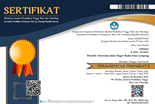Examining the Impact of Electronic Game Usage on Kindergarten Children's Behavior in the Sharazur District: Insights from Parental Perspectives
Abstract
This research investigates the detrimental effects of electronic game use on the behavior of kindergarten children, with a focus on gender disparities, as perceived by parents in the Sharazoor district. The study, employing descriptive methods, encompasses a sample of 160 equally distributed children of both genders from kindergartens affiliated with the Directorate of Education of Sharazoor—specifically, Mastan, Chro, Sara, and Papula. Utilizing a survey form comprising 32 items, the researchers statistically analyze the collected data, assigning three response options (Yes, Sometimes, No) with corresponding marks (3,2,1).
The psychometric measures, including arithmetic mean, discriminant values, T values for one and two samples, Jetman statistical coefficient for distribution, and Cooper statistical coefficient using the t.test, were employed for data analysis. The key findings reveal that 90% of boys (72 out of 80) engage in electronic game usage, while 75% of girls (60 out of 80) participate in such activities. This discrepancy underscores a notable difference in electronic game usage between boys and girls in the experimental community, indicating a higher prevalence of electronic game addiction among boys. The study concludes with several recommendations for mitigating the negative impact of electronic game use on kindergarten children's behavior, acknowledging the importance of gender-sensitive interventions in addressing this issue.
Keywords
Full Text:
PDFReferences
. Al-Sayed, Mohammad Naji, 2021, the work of the practice of the electronic interaction of Ali Al-Zakarah, Al-Turbiyah magazine, Al-Mulk Al-Mansurah University.
. Hassan, Al-Sayyed Abu Muhammad Abu Hashem. (2005): Meta-analysis indicators for self-efficacy research in the light of Bandura's theory, Research Center of the Faculty of Education, King Saud University - Kingdom of Saudi Arabia.
Abdalwahid Ahmed, A., Mazhar Jafr, M., Ahmed Hama Saeed, M., Omer Ali, A., Faraj Mahmood, B., Naib Muhammad, S., & Azad Abdullah, S. (2022). The Impact of Social Media on the Interaction Between Students and Teachers at the University of Halabja. Journal of Philology and Educational Sciences, 1(1), 27-37.
Al-Aydi, Ahmed Sami Abdul Wahab, and Rehab Ibrahim Rafat Mohammad Al-Sayed, Amira Mohammad Mohammad Ahmed (2023): Mothers' attitudes towards children's use of electronic games and the effects on them: Masahiya study, Faculty of Arts/Department of Communication and Media Technology/Faisal University of Imam Abd al-Rahman bin .
Al-Bayati, Abd al-Jabbar Tawfiq and Apnasius, Zakaria Zaki (1977): descriptive statistics and evidence in education and psychology, National Library, Baghdad.
Al-Esami, Hala Fawzi Abdul-Fattah (2023): The negative effects of electronic games on children and their prevention mechanisms from the point of view of teaching staff in childhood education colleges, Journal of the Faculty of Education, No. 133.
Al-Hadlaq, Abdullah bin Abdulaziz, 2013, Pros and Cons of Electronic Games and the Reasons for Practices and the Opinions of General Education Students in Madina Al-Riyadh, Faculty of Education, Al-King Saud University, Al-Riyadh, Magazine of Reading and Knowledge, A.D. 551, 831
Al-Rimawi, Mohammed Oda, 2010, in Child Psychology, Vol. 1, (translated by Ari Osman Khayat), Erbil, Iraq
Ammar Ihsan Nasution, Mohamad Syafiq Ashraff, Mohamad Shukri Bin Mohamed Fathil (2015). "A Study on the Relationship between Video Games and Student's Academic Performance in IIUM" , Kulliyyah of Information and Communication Technology, International Islamic University Malaysia,3(4), 106-111.
Aziz, Ezaddin Ahmad, (2014): Principles of General Psychology, Rojhelat Printing House, 5th Edition, Erbil.
Bakar, Abdulkarim, 2019, Our Children and Social Networks, Ara Printing House, Vol. 1, Sulaimani
Cooper, John D. Measurment and Analysis of BehaviouralTechniques,Columbus, ohio, Chales, E, Merrill, 1974.
Fouad Ghafor, O., Mustafa, G. O., & Ahmad, H. M. (2019). Edutainment Tendencies among EFL Learners at the University of HalabjaDepartment of English Language. Journal of University of Human Development, 5(3).
Gashaj, V., Dapp, L. C., Trninic, D., & Roebers, C. M. (2021). The effect of video games, exergames and board games on executive functions in kindergarten and 2nd grade: An explorative longitudinal study. Trends in Neuroscience and Education, 25, 100162.
Gyunesh Adam, 2018, common mistakes in child education (translated by Shiaw Nawroli,), Ara Printing House, vol. 2, Sulaimani
Hussein Salih, M., Muhamad Ahmad, H., Ata Mahmod, H., Abdalwahid Ahmed, A., Omer Abdullah, S., & Wali Salih, K. (2022). The Anxiety Level of Students about the Future: Case of Education College of Sharazur at the University of Halabja. Journal of Philology and Educational Sciences, 1(1), 16-26.
Ihori, N., Sakamoto, A., Kobayashi, K., & Kimura, F. (2003) Does video game use grow children's aggressiveness?: Results from a panel study. Proceedings of the 34th Annual Conference of the International Simulation and Gaming, Kazusa Akademia Park, Chiba, Japan.
Jamal, Sozan, 2006, Child Psychology, Ministry of Culture Press. Ch1, Erbil, Iraq
Karachetani, Karim Sharif, 2007, General Psychology, Haji Hashim Printing House, Vol. 2, Erbil
Khal, Sheikh Mohammed, 1960-1976, Farhangi Sheikh Mohammed Khal, Kamran Printing House, vol.
Massoud, Hassan Rezaei, 2013, investigating the relationship between personality traits and mental health and self-esteem
Salen،K.،& Zimmerman،E. (2004). Rules of play: Game designfundamentals. Cambridge،MA: MIT Press. Visual Communication, 4(1): 121-126.
Salih, M. H., & Mustafa, S. B. (2018). Optimism and pessimism among primary school principals In the province of Halabja. Journal of College of Education, 1(6), 195-216.
Sheikh Amini and Behrani, Ali 2003, Analysis of computer games with addictive behavior and academic performance of children and adolescents. Master's thesis, Tehran Azad University
Sherzad, Faqe Ali, 2013, Why does your child do this (Mandalakat Bo Wadekat), Mukriyan Printing House, Vol. 2, Erbil
Straker, L., Abbott, R., Collins, R., & Campbell, A. (2014). Evidence-based guidelines for wise use of electronic games by children. Ergonomics, 57(4), 471-489.
DOI: http://dx.doi.org/10.24042/00202362028700
Refbacks
- There are currently no refbacks.
Copyright (c) 2023 Fryad Majeed Salih, Mihraban Hussein Salih, Farah Taha Darwesh, Mawdud Jabar Abdulla











